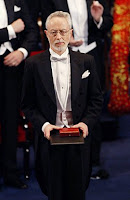Know Your Laureate of African Origin Part V - J. M. Coetzee
 |
| J.M. Coetzee |
Born in Cape Town on February 9, 1940, Coetzee attended St. Joseph's College and later studied Mathematics and English at the University of Cape Town, graduating in 1960 and 1961 with Bachelor of Arts with Honours and Honours in Mathematics respectively.
Coetzee worked as a computer programmer at IBM from 1962 to 1965. He later worked for the International Computers Limited in Bracknell, Berkshire. During this period he was awarded with a Master of Arts degree from the University of Cape Town for a dissertation on the novels of Ford Max Ford. He later received a PhD in Linguistics in 1969 from the University of Texas with thesis topic on the computer stylistic analysis of the works of Samuel Beckett. He taught English and Literature at the University of New York before he was arrested for criminal trespass together with 45 other faculty members who had occupied the university's Hall. He returned to University of Cape Town where he taught English and Literature and in 1963 promoted to Professor of General Literature.
Coetzee spoke against the limitations of art in South African society under the apartheid regime, calling on the regime to abandon its apartheid policy. Some scholars and readers claim that his Booker-winning novel Disgrace allegorises the South African Truth and Reconciliation Council.
Coetzee has won many awards including being a three times winner of the CNA Prize. His novel Waiting for the Barbarians was awarded the James Tait Black Memorial Prize and the Geoffrey Faber Memorial Prize. Age of Iron was awarded the Sunday Express Book of the Year award. The Master of Petersburg was awarded the Irish Times International Fiction Prize in 1995. He also won the French Prix Femina Etranger, the Commonwealth Writers Prize, and the 1987 Jerusalem Prize for Fiction of the Individual in Society. He was the first author to have won the Booker on two different occasions for Life and Times of Michael K in 1983 and Disgrace in 1999. He was shortlisted in 2009 for Summertime and longlisted in 2003 for Elizabeth Costello and in 2005 for Slow Man.
On October 2, 2003, John Maxwell Coetzee won the Nobel laureate for his
...well-crafted composition, pregnant dialogue and analytical brilliance
Bibliography
Coetzee's published work consists of fiction, fictionalised autobiographies and non-fiction.
Fiction
- Dusklands (1974)
- In the Heart of the Country (1977)
- Waiting for the Barbarians (1980)
- Life and Times of Michael K (1983)
- Foe (1986)
- Age of Iron (1990)
- The Master of Petersburg (1994)
- The Lives of Animals (1999)
- Disgrace (1999)
- Elizabeth Costello (2003)
- Slow Man (2005)
- Diary of a Bad Year (2007)
Fictionalised Autobiography
- Boyhood: Scenes from Provincial Life (1997)
- Youth: Scenes from Provincial Life II (2002)
- Summertime: Scenes from Provincial Life (2009)
Non-Fiction
- White Writing: On the Culture of Letters in South Africa (1988)
- Doubling the Point: Essays and Interviews (1992)
- Giving Offense: Essays on Censorship (1996)
- Stranger Shores: Literary Essays, 1986-1999 (2002)
- Inner Workings: Literary Essays, 2000-2005 (2007)



Ooooooooooooh!! This has long, long been awaited. He is my man. His book disgrace started my foray into reading and appreciating literature. And yes... his works are full of pregnant dialogues. Plz, Plz, Plz, Plz... anybody who visits this post should read 'Disgrace' for me - it's one of my all time favs. Thanks for this review, Nana.
ReplyDelete@Geosi, I know how much you appreciate the works of Coetzee. I have read the first two books but not Disgrace. I promise you that anytime I lay my hands on THAT book, I would read it before any other scheduled readings.
ReplyDeleteI really must read something by this author soon. I seem to say that about quite a few of the Nobel winers of African origin. I think I've read more by them than by non-African winners though!
ReplyDelete@Amy, I have quite a few Nobelists on my TBRs and I found that I have read little of them. It was this realisation that made me search for them. Even now I can't say I have read that much. For instance, Wole Soyinka (1); Nadine Gordimer (0); Mahfouz (0); Coetzee (2); Camus (0). See? It's that bad. However, it is similarly bad on the other side. Only Toni Morrison (1) and Naipaul (2) count in my non-African Nobelists.
ReplyDeleteWe have to do more
Hmm... I stand at Pearl S. Buck (1), Ernest Hemmingway (4), Gabriel Garcia Marquez (1), Wole Soyinka (1), Naguib Mahfouz (1), V. S. Naipaul (1), Orhan Pamuk (1).
ReplyDeleteThat is actually more than I thought! I have more by Marquez, Soyinka, and Pamuk on my tbr shelf as well, and a few other laureates.
@Amy see? I only have Soyinka (1) and William Golding (1). lol. Marquez, Mahfouz and Hemmingway are on my reading list.
ReplyDelete